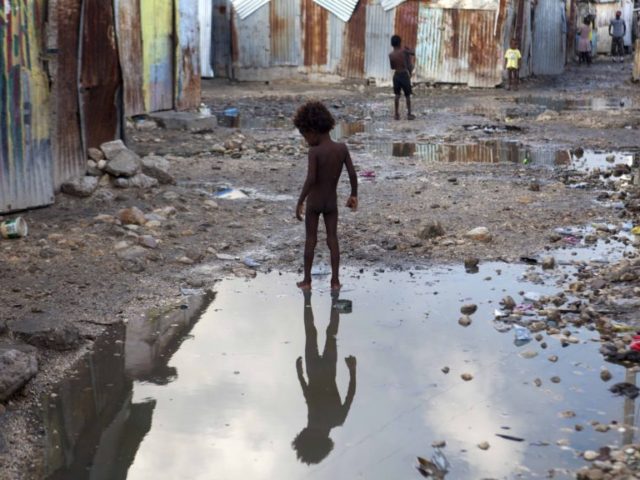Haiti is once again in the news. This poverty-stricken, disease-ridden, and politically-unstable Caribbean nation was reportedly on the receiving end of some unflattering comments recently attributed to U.S. President Donald Trump during a private meeting on immigration, which he and other participants denied.
Some Haitians and others protested the president’s alleged remarks. However, the criticism doesn’t serve to change the horrible living conditions in that county. The welfare of the Haitian people should be the primary focus of everyone’s attention.
Throughout its history, and especially during the past three decades, Haitians have experienced military coups, the Clinton administration’s unsuccessful use of a large U.S.-led international military intervention of 23,000 troops to “restore democracy,” and natural disasters which pummeled the island. Despite massive amounts of international and regional aid and assistance and governmental changes, solutions to Haiti’s problems remain elusive.
Unfortunately, many people in the Western Hemisphere and elsewhere seemingly know little about Haiti’s remarkable history – or care much about the dire circumstances Haitians face daily once each crisis temporarily recedes from the public stage.
Haiti is one of the 36 nations and a territory comprising the Western Hemisphere. It occupies one-third of the island, with the Dominican Republic controlling the rest. Haiti’s population is 10.7 million people, about 95 percent black. Its official languages are French and Creole. And its official religions are Roman Catholic and Voodoo.
Haiti’s genesis traces back to Christopher Columbus’s discovery of Hispaniola (translation Little Spain) in 1492. Spanish settlers eventually supplanted the island’s Taino native population. By the end of the 17th century, Spain ceded control of the Western part of the island to the French, which caused it to prosper largely because of coffee and sugar production. At its peak prosperity, that part of the island was inhabited by some 500,000 slaves of African origin and 32,000 whites. In the late 18th century, a group of former slaves led in part by Toussaint Louverture organized a full-fledged uprising that toppled the colony. In 1804, Haiti became the first free black republic in the world, the first independent state in the Caribbean, and the second independent state in the Western Hemisphere after the United States.
Sadly, today’s Haitians do not enjoy the full fruits of the political, economic, and social freedom their ancestors sought. A string of authoritarian governments, political corruption, extreme poverty, rampant disease, illiteracy, modern-day slavery, crime, and natural disasters make daily life a continuing challenge.
Transparency International ranked Haiti among the world’s most corrupt governments in 2016, ranking it as the Hemisphere’s second worst, next to Venezuela. Corruption impacts societies in a multitude of ways. In the worst cases, it costs lives and it zaps the people of their freedom, health, and money.
Haitians average annual income is $1,800, which makes it the Hemisphere’s poorest country. Almost 60 percent of Haitians subsist below the $2.41 per day poverty level, and 24 percent under the extreme poverty level of $1.23 per day. The poverty has been exacerbated by natural disasters like the massive 2010 earthquake and 2015 hurricane.
The average Haitian life expectancy is 64 years, the Hemisphere’s shortest lifespan, versus 77 years for the Hemisphere’s 982 million other residents. About 150,000 Haitians are infected with the AIDS virus, giving it the highest percentage of the disease among Hemisphere nations and causing limited mortality. Haiti also has the dubious distinction of being designated as a very high-risk major infectious disease nation.
Haiti’s illiteracy rate is 39 percent, making it the Hemisphere’s most illiterate nation. Reportedly, 50 percent of Haiti’s children do not attend school; 30 percent of the children attending school do not make it to the third grade; and 60 percent of the children abandon school before sixth grade.
Haiti is a source, transit, and destination country for men, women, and children subjected to forced labor and sex trafficking. One in four children do not live with their biological parents and an estimated 286,000 children (Restaveks) under age 15 work in domestic servitude. A long-awaited anti-trafficking law was promulgated in 2014, but enforcement remains weak.
Violent crime is common in Haiti. The U.S. State Department recently issued a January 2018 travel warning advising visitors to reconsider travel there. Local police reportedly lack the resources to respond effectively to serious criminal incidents or emergencies. Protests, tire burning, and road blockages are frequent and often spontaneous.
Interestingly, while millions of Haitians are struggling with hardships, their island cohabitants in the Dominican Republic are seemingly not. For example, Dominicans have an average annual income of $17,000; expected lifespan of 78 years; and an illiteracy rate of 5 percent. These statistics beg the question: why can’t Haiti replicate Dominican Republic success?
Those in the U.S. and elsewhere who quickly criticized President Trump over a disputed term in describing Haiti would better serve humanity’s interest by focusing their time and energy on finding out more about that country and seeking solutions for its problems. However, money and migration alone will not solve them. Since the 2010 earthquake the U.S. has invested $4.7 billion to rebuild and develop the country and since 1960 the U.S. Haitian population has grown from 5,000 to 676,000 – but core problems still remain.
It will undoubtedly take time, patience, ingenuity, and resolve to make Haiti a better place. And success can only be achieved with the full commitment of Haitians to improve their government, country, and lives – with support and assistance from groups like Organization of American States countries, including the United States. Only then will Haitians finally realize the dream of their ancestors who liberated them from colonial masters. And when that happens, Haiti, the region, and the world will be better off. And, hopefully, it happens during President Trump’s tenure.
Fred Gedrich is a foreign policy and national security analyst. He served in the U.S. departments of State and Defense – and he has visited Haiti on an official U.S. mission.

COMMENTS
Please let us know if you're having issues with commenting.